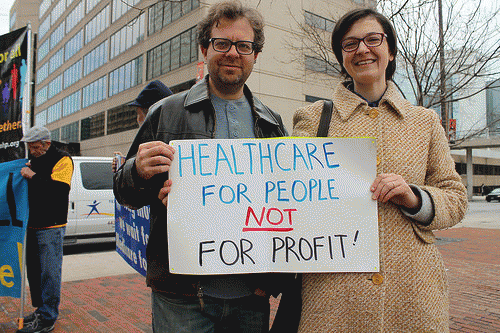This piece was reprinted by OpEd News with permission or license. It may not be reproduced in any form without permission or license from the source.
Not only that, but insurers quickly discovered the dirty secret of health care finance: Sick people are expensive and make up most costs, while healthy people are profitable.
In other words, the vital lesson for an insurer looking to make money is to identify the few sick people and get them to go away ("lemon dropping") and find the healthy majority and do things that attract them to your plan ("cherry picking").
Insurers are happy to offer discounts on fitness club memberships to attract healthy people, for example. But they punish the sick with higher copays and deductibles, as well as increasingly restrictive and intrusive regulations on preauthorization.
Economists call it adverse selection. Regular people call it paperwork hell. Whatever the name, it's the purpose of increasingly complicated insurance plans and reimbursement forms.

Insurers use 'lemon dropping' and 'cherry picking' to control costs.
(Image by flyingroc) Details DMCA
The public and government authorities figured this out quickly, but too often the cures have been as bad as the disease.
We could, and I believe should, have abandoned the use of for-profit private insurance to adopt a simple single-payer system, in which a government agency would provide coverage to everyone in the U.S. Instead, in forging the ACA and in every other health reform enacted in the past 40 years, policymakers decided to work with private insurance while trying to fix some of its evils.
We adopted the "Patient's Bill of Rights" around the turn of the century and created processes to allow patients and providers to appeal medical decisions made by insurers. State health commissioners now have considerable power to supervise insurers, while the ACA mandates certain essential benefits be provided in all insurance plans.
Yet each of these efforts to protect the sick from abuses inherent in the for-profit insurance system only added to the administrative burden, and the costs, on the entire industry.
Some perceived the problem as a lack of market competition so governments freed hospitals and other health care providers from regulations on prices and restrictions on mergers, advertising and other practices. Far from reducing administrative complexity or lowering prices, research has shown that deregulation made both problems worse by allowing the formation of networks of hospitals and providers who use advertising and other business and financial practices to control markets and stifle competition.
Simply put, each attempt to fix a problem has led to more administration because we have kept intact the system of private health insurance -- and for-profit medicine -- that is at the root of at the dual problems of rising health care costs and growing complexity.
It's time to take a step backClearly, our experiment in market-driven health care has gone awry.
Before we introduced competition and deregulation into health care, things were relatively simple, with most revenue going to providers. We could save a lot of money if we went backwards and adopted a single-payer system like Canada's, where insurers do not engage in systematic preauthorization or utilization review and hospitals and pharmaceutical companies do not form monopolies to profit at the expense of the public.
Largely by reducing administrative costs within the insurance industry and to providers, a single-payer program could save enough money to provide health care to all Americans.
Compared with Canada's single payer system, American doctors and hospitals have nearly twice as many administrative staff workers.
(Note: You can view every article as one long page if you sign up as an Advocate Member, or higher).






